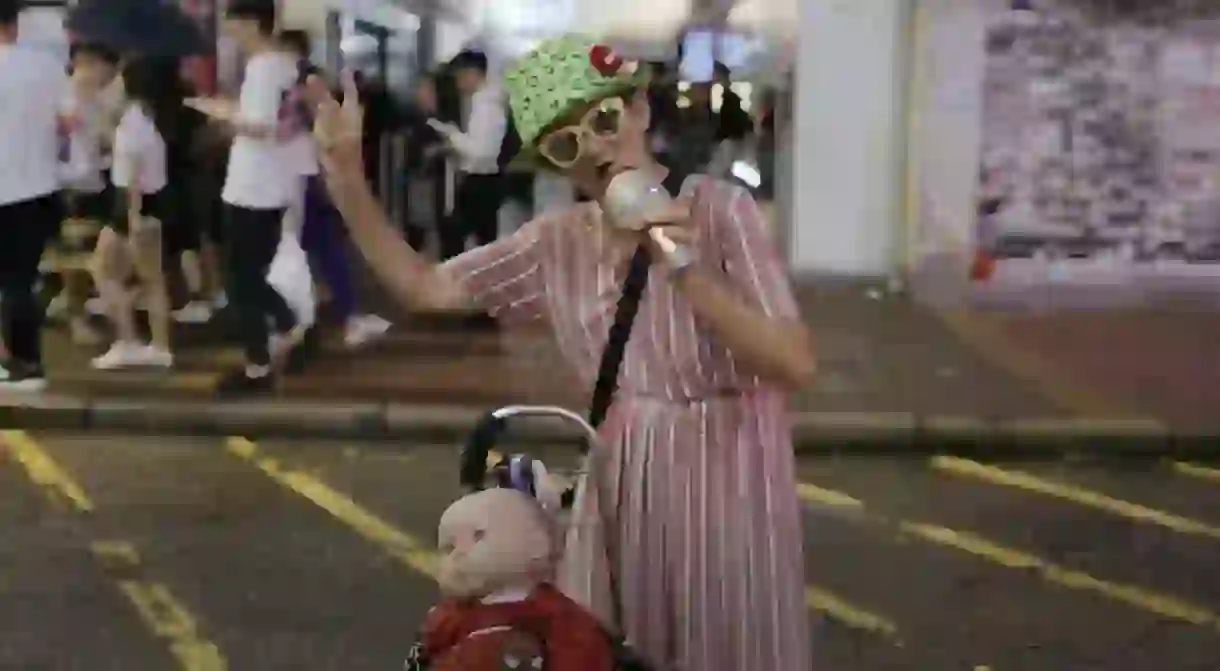Is the Show Over for Mong Kok’s Street Performers?

In the heart of Hong Kong’s most densely populated district, Mong Kok, the busiest street in the city had become synonymous with one thing – street performers. However, earlier this year, they were banished from the area leaving many to question if the show is over for street entertainers in the city.
Walking through the pedestrian zone in Hong Kong’s Sai Yeung Choi Street South, you might have encountered anything from a searing rendition of Cantonese opera to a Michael Jackson tribute – it was a completely unpredictable mix of old, new and everything in between. Day and night, street performers would blast out an array of different tunes on portable speakers and karaoke machines as passers-by looked on either amused or confused by it all.

It was the street that never slept. Located in the heart of Hong Kong’s Mong Kok district – “busy corner” in Cantonese – the pedestrianised zone was a sea of people, performers and chaotic energy, the sort of place you could hear long before you saw it.
Integral to its character were the unabashed street performers that, for some, were the life and soul of the area. Yet, for others, especially local residents, the noise was a constant disturbance. In late July of this year, after 18 years and more than 1,200 noise complaints, the government decided the show was finally over. The pedestrian zone was reopened to vehicles and the street performers were forced out.
For one of the street’s regular performers, a retired taxi driver named Lam, who had been entertaining crowds by singing and playing his guitar for almost a decade, there was no other place quite like it. “To me, this is the most vibrant street in the world”, he said. “There are always different people walking by, 10,000 passers-by every hour, it was the best performance place in Hong Kong.”

For Wu Seng-Teng, an elderly lady who had also been performing on the street for many years, there were only ever positives to draw from the entertainment. “I hope that Mong Kok will always be a place of entertainment”, she said. “Every resident here loves entertainment. Entertainment brings health, happiness and cures diseases – I hope the government doesn’t stop Mong Kok and allows us to continue creating joyous moments here.”
The positive sentiment was shared by some of the street’s regular spectators who also voiced their disapproval of the closure. “I don’t think it’s a good idea to shut it down, many foreigners come by and this is considered one of the attractions of Hong Kong. They would come for the music and to have some fun.”
“This is a great place of entertainment”, echoed another spectator. “There are so many performances and songs and they are free. It should, therefore, be preserved.”

But, aside from the praise, even some of the performers could recognise that the street was poorly managed. “I think it was mismanaged from the start”, says Lam. “There are too many people causing the noise now. Even amateurs are singing with karaoke machines. If everyone sings karaoke out here, then it’s not an artistic performance anymore.”
In the end, Lam says he could recognise that there were too many “karaoke singers”, resulting in amplifiers competing with each other and so, the government had to step in and shut it down.
But Lam laments the fact that the government just penalised the performers and did not provide any other venue for them to move to. “I’ve received three fines and they were huge fines for causing a disturbance. But I will not plead guilty – I will defend my case even if I have to go to jail.”

Undeterred, Lam and his fellow street performers are determined that the show must go on and have already got their sights set on other performance spots in Hong Kong. “One of the policemen gave me the chance to apply for a permit, which allows me to play in Tsim Sha Tsui”, says Lam. “Perhaps his conscience hurts.”
Since the closure of the pedestrian zone in Mong Kong, like Lam, many of the street performers have moved their acts to the public space outside the Star Ferry Pier in Hong Kong’s Tsim Sha Tsui district. Yet, not everyone was happy to welcome their arrival. Rather than being met with fans and supporters, many were circled by demonstrators who took to the streets demanding the performers be removed for causing a disturbance and for deterring people from shopping in the area with their “low quality” performances.
At least, for now, it remains unclear whether the street performers of Mong Kok will find a suitable replacement where they can express themselves free of complaints, vehicles and fear of arrest. Until then, they live in hope that the show will, eventually, go on.













